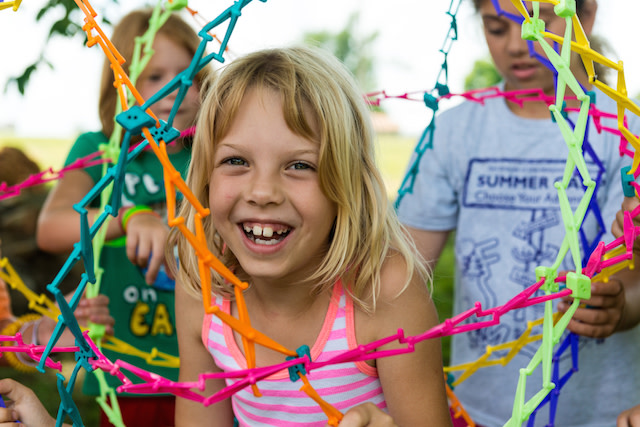Donor Says Girl Scouts Can't Use $100K Gift for Transgender Girls

Courtesy Girl Scouts of Western Washington
A $50,000 donation is cause for celebration at the Queen Anne offices of the Girl Scouts of Western Washington. “We have these little clapper thingies, and the clappers go mad when we get that kind of gift,” says the council’s CEO, Megan Ferland. So when Ferland came back to the office earlier this spring and announced that she’d just landed a $100,000 donation, the place went mad. Not only did it represent nearly a quarter of the council’s annual fundraising goal, it would pay to send 500 girls to camp. “We were thrilled,” Ferland says.
Except there was a catch. In late May, as news of Caitlyn Jenner’s transition was blowing up your Facebook news feed, she received a letter from the donor with a brief request: Please guarantee that our gift will not be used to support transgender girls. If you can’t, please return the money.
Ferland chooses her words carefully when discussing the donor, whose identity she won’t reveal out of respect for their privacy. “The relationship is complex,” is all she’ll say. But she does admit to being “very sad” upon receiving the letter. Shortly after that, though, she made up her mind about how to respond: In a short letter, she informed the donor that she would, in fact, be returning the money. Her reasoning was simple. “Girl Scouts is for every girl,” she says. “And every girl should have the opportunity to be a Girl Scout if she wants to.”
This is the second time in less than five years that a Girl Scouts council has taken a public stand to support transgender girls, and both times Ferland was at the center of the story. In 2012, when she headed the organization’s Colorado council, a 7-year-old transgender girl in Denver was denied entry to a troop. Although the council had never specifically said that it accepted transgender girls, the national organization had always made inclusivity the foundation of its mission. So after checking with the council’s attorney, Ferland issued a public statement welcoming transgender girls and explaining that the council was working to find a troop for the girl who’d been rejected. “Every girl that is a Girl Scout is a Girl Scout because her parent or guardian brings her to us and says, ‘I want my child to participate,’” Ferland says. “And I don’t question whether or not they’re a girl.”
She’s not shying away from controversy this time, either. And an Indiegogo campaign that the Girl Scouts of Western Washington launched Monday morning makes that pretty clear: “Help us raise back the $100,000 a donor asked us to return because we welcome transgender girls,” reads the council’s statement on the site, front and center under a video proclaiming that “Girl Scouts is for every girl.”
The Gender Justice League, which supports the transgender community in Seattle, has pledged to spread the word about the campaign. “We’re so profoundly grateful that Girl Scouts of Western Washington are standing by their values to support all girls,” says executive director Danni Askini. “It’s also mortifying that the donor withdrew this funding. It’s a clear example of how much bias and prejudice against transgender people still exists in our society.”
The word inclusivity comes up a lot when talking to Ferland about Girl Scouts, and according to a psychology professor at the University of Washington, it’s a concept that’s even more important to transgender children. “It certainly is the case that for all people—transgender or otherwise—having people acknowledge the identity that you see yourself as having is very important,” says Kristina Olson. “And feeling supported in who you are—in any aspect of any kid’s life—is going to make them feel better about themselves, do better in the world. So we have a lot of evidence that what we call social support is associated with much better outcomes for kids. And that seems to be especially true among transgender kids.”
Yet while they may acknowledge their identity to themselves, being open about it with others can be much more difficult. “There’s a lot of violence and discrimination and prejudice against transgender people,” Askini says. “So even if people know they’re transgender, they don’t always transition because of that prejudice and bias and discrimination. So the thing about Girl Scouts that’s so vital to all girls is that it’s about creating community and ending isolation.”
Olson is currently conducting a long term study on gender identity among young children. Among the more than 100 trans children her research has focused on in the last two years, 97 percent identified themselves as being the opposite gender than their sex would suggest between one and a half and three and a half years of age. “And that’s the same age that we see other kids who aren’t transgender identify their gender for the first time,” she says.
The Girl Scouts of Colorado took heat from some parents for taking such a clear stand in support of transgender girls, but Ferland wasn’t worried about blowback then. And she isn’t now. “This is the right thing to do, so there was not anything else to do other than return the gift,” she says. “And we need the $100,000 back so we can serve more girls. So we’re going to do everything we can to raise that money. And if it raises a ruckus, it raises a ruckus.”
If the results of the campaign after one day are any indication, it already has. By 5pm—just nine hours after going live—the council had raised nearly $25,000.
UPDATE: As of 9:30am on June 30, the Girl Scouts had surpassed their $100,000 goal.




